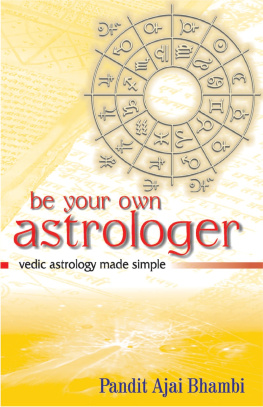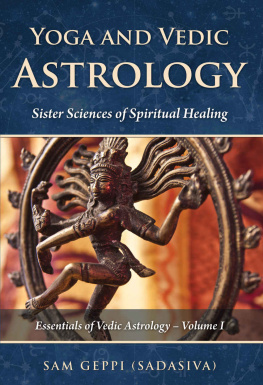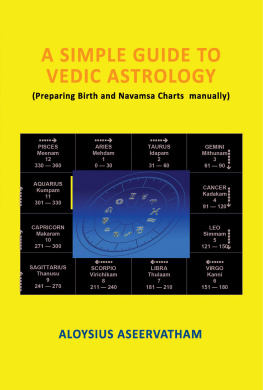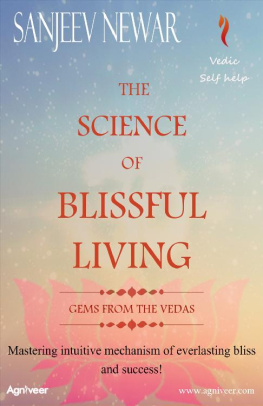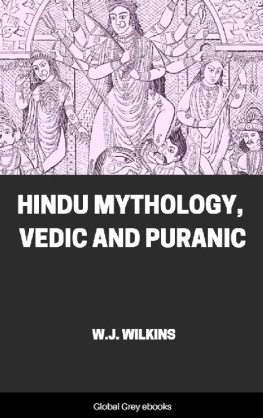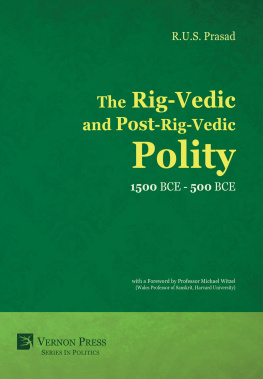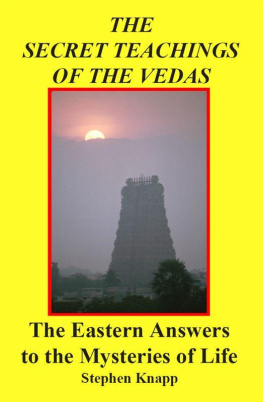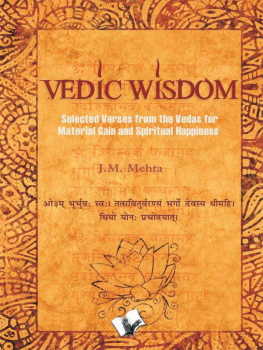Essentials of
Vedic Wisdom
for Blissful Living
U. Mahesh Prabhu
With
Dharali Sharma
Foreword by
Dr. David Frawley

Vedic Management Centre
www.vedic-management.com
Vedic Management Centre
U. Mahesh Prabhu
All rights reserved. No part of this publication may be reproduced or transmitted, in any form or by any means, without prior permission from the publisher.
First published in 2017
Vedic Management Centre
Email:
Website: www.vedic-management.com
Dedication
To Madhavmam (Late M. V. Kamath [1921 2014]), to whom I remain indebted for his confidence in me.
To Vamadeva ji ( Dr. David Frawley ) , for his continuing support and enduring love as mentor and friend.
To Winston, for being my friend for all seasons
U. Mahesh Prabhu
*
To my parents, Manju and Arun Kumar Sharma, who are my first teachers
Rahul and Vrinda, for all the love
U. Mahesh Prabhu, for his confidence and support
Rachit Singh, I am a better person because of you
And to all extended family, friends, and teachers who have guided my path.
Dharali Sharma
FOREWORD
Vedic wisdom is perhaps the most important system of knowledge for the future well-being of humanity and for the planet overall. It connects our human species to its higher purpose as an evolution of cosmic consciousness, without which we may be challenged to survive in this high-tech era and its artificial and complicated way of life.
Vedic knowledge occurs on two interrelated levels. The first level is knowledge of the human being, not just as a physical body, but as a manifestation of a higher awareness. Vedic knowledge is Self-knowledge, which is not merely knowledge of our physical or psychological selves, but of our true eternal nature beyond body and mind, time, space and karma .
The second level is knowledge of the universe, not just at an outer level, but at an inner level as a manifestation of consciousness on all levels from the subatomic to the supragalactic. These two levels of knowledge are ultimately one. The entire universe dwells in our own hearts as our own true nature. All the laws of nature and the universe work as one organic being, with the whole reflected in every part
Such a view of cosmic knowledge looks to a direct experience of universal truth within us. It is not merely knowledge of name, form or number. It is not merely an understanding of natures forces or a manipulation of the external world, which always remains problematical. It directly perceives the entire world as part of our own greater being.
Vedic wisdom is not any mere outer information or data, such as our computers provide us with. To receive it requires not just getting more knowledge but changing who we are at a fundamental level. Accessing it rests upon a certain way of life and behavior defined by principles of dharma and right living. This means being in control of the mind and senses, letting go of the ego, and not pursuing the material world and personal enjoyment as our primary way of life.
Vedic wisdom calls us to move beyond desire, greed and attachment, renouncing our arrogance of knowing and trying to control life and instead surrendering to the Divine presence behind natures wonders. It requires truthfulness, honesty, self-discipline, selflessness and a respectful receptivity to the wisdom of the sages.
While people today can easily read books and articles and grasp complex ideas and detailed information, such a behavioral basis to approach higher consciousness is rare and requires a great deal of work on oneself in order to achieve. Such behavioral changes are the essence of the traditional practice of Yoga that is rooted in yamas and niyamas or principles and practices of right living starting with truthfulness and non-violence ( satya and ahimsa ).
Vedic wisdom is not another fad, psychological approach or religious belief. It requires deep introspection within and profound contemplation of nature without, allied with a willingness to transform ourselves according to a higher will and awareness. Yet this makes it more powerful and lasting in its results, which is to unfold our deepest potentials.
In their current book, Essentials of Vedic Wisdom for Blissful living , Mahesh Prabhu and Dharali Sharma endeavor to present Vedic wisdom in a simple, yet clear and profound manner that the modern reader can easily access, for whom the Vedic vision and way of life, with its very different background, may initially be hard to understand. Such transcriptions of Vedic wisdom without compromising its essence are very important today when the social media is flooded with misleading information and limited views of reality.
Each chapter of the book provides a different perspective on Vedic living that can be used as a doorway to enter into a broader Vedic understanding of who we truly are which is much more than even our current science and technology has yet imagined. Such writings are best slowly read and contemplated in order to properly appreciate and absorb.
U. Mahesh Prabhu is a noted teacher and author in the field of Vedic management. Dharali Sharma is a highly qualified economic as well as financial consultant. Together they aim to bring this powerful Vedic approach to the public and to sincere individuals and groups throughout the world. This book represents the initial presentation of their ideas and helps us understand their values and way of thought. The Vedic Management Center is a new organization developed by them to address these issues and provide guidance on how to develop a Vedic way of life that is both many-sided and sustainable. The organization is likely to grow rapidly in the years to come.
Vedic management, to put it simply, is a life managed according to Vedic wisdom and Vedic principles of right living, addressing individual and collective, private and public levels. These approaches are explored in detail from various angles in Vedic disciplines like Yoga , Ayurveda and Vedanta . Vedic wisdom requires a Vedic life, which is a life lived according to a universal vision. The current book can serve a good contemporary introduction to this transformative process of Vedic wisdom that is beneficial to all.
Dr. David Frawley
Founder & Director
American Institute of Vedic Studies
Santa Fe, USA
www.vedanet.com
March 2017
Table of Contents
Introduction
The Vedas were composed thousands of years ago, so why should we bother studying or understanding their outdated teachings? On the contrary, science and technology have transformed our world in ways that are easy to see. We live surrounded by modern luxury and comfort, something Vedic people would have probably only dreamed of. Given this fact, is there anything truly worthwhile to learn from ancient Vedic wisdom? Thoughts like these must have certainly crossed your mind, making you sceptical towards any Vedic teachings.
It is true that science and technology have transformed our lives like never before. However, on deeper introspection we find that many things in life remain the same, with unhappiness and sorrow touching us all. Diseases of the past have given way to complex diseases today, some new to medical science, with more of us relying on daily medications to deal with them. People suffered pain in the past just as they do today, perhaps for different reasons. There was love then as there is today, however our relationships seem to have become more fragile. There was hate then, and certainly enmity is very common today.
Our external reality may be vastly better than it was in the past but our inner feelings have not changed very much. Fear, desire, anger, difficulties in relationships, the struggle and stress of daily living still plague us. One wonders if we are happier than the people of yore, or simply more busy and preoccupied. We have improved our outer appearance but our inner issues remain the same. In fact, today we seem less capable of dealing with difficulties or finding any lasting peace of mind.
Next page


